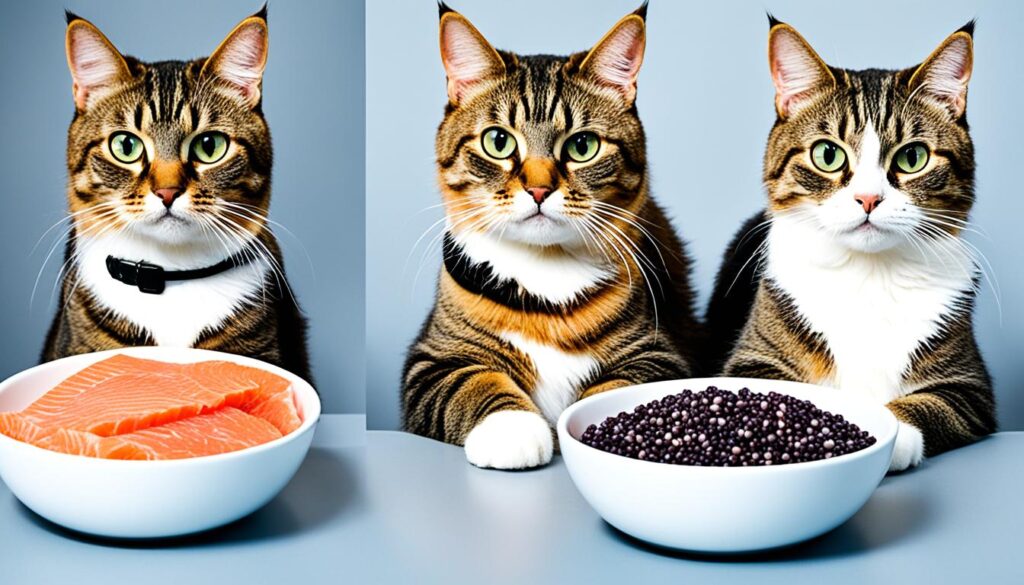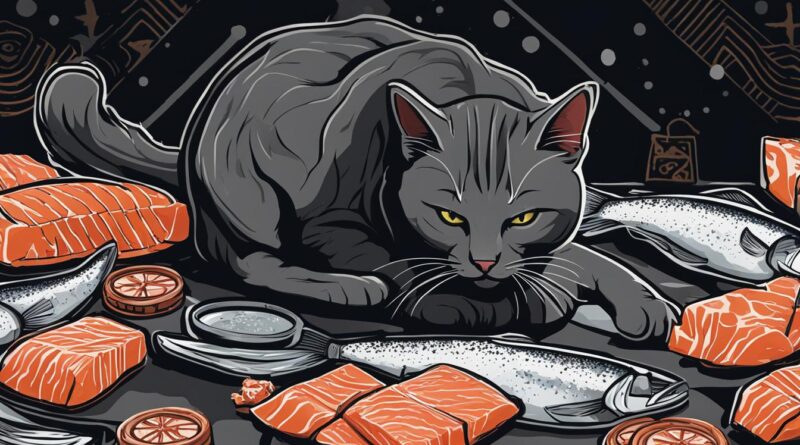Can Cats Eat Raw Salmon? Feeding Tips & Risks
Many cat owners wonder whether it is safe to feed their furry companions raw salmon. While cats love the taste of fish, including salmon, it is important to consider the potential risks involved in feeding them raw seafood. In this article, we will explore the topic of cats and raw salmon, discussing the benefits, risks, and proper feeding guidelines.
Raw salmon poses several risks for cats, including the presence of parasites, bacterial infections, and viral infections. To minimize these risks, it is best to cook salmon thoroughly before offering it to your feline friend. This not only helps eliminate potential pathogens but also reduces the chances of gastrointestinal upset.
While salmon can be a healthy addition to a cat’s diet, it should not be the sole source of nutrition. Cats require a balanced diet that provides all the essential nutrients they need to thrive. Commercial cat food products that contain salmon can be a safe alternative, ensuring that your cat receives a well-rounded diet.
Key Takeaways:
- Cats can eat raw salmon, but it is not recommended due to the risks of parasites and infections.
- Cooked salmon is a safer option and can be a part of a balanced diet for cats.
- Salmon provides several health benefits for cats, including omega-3 fatty acids and essential nutrients.
- Feeding cats raw salmon should be done in moderation and as a treat, not as a main food source.
- Consult with a veterinarian for specific dietary recommendations for your cat.
Health Benefits of Salmon for Cats
Salmon provides several health benefits for cats. It is high in protein, omega-3 fatty acids, and other nutrients. The omega-3 fatty acids in salmon can help maintain joint health, promote cardiovascular health, support eye health, improve skin and coat quality, and boost cognitive function. Salmon also contains vitamins and minerals essential for a cat’s overall health.
The protein found in salmon is crucial for cats as it supports muscle growth and repair. Additionally, the omega-3 fatty acids found in salmon have anti-inflammatory properties that can be beneficial for cats with conditions such as arthritis and allergies.
In terms of cardiovascular health, the omega-3 fatty acids found in salmon can help reduce the risk of heart disease and lower blood pressure in cats. These fatty acids also support the development and maintenance of a cat’s brain and nervous system, enhancing cognitive function and improving overall brain health.
Salmon is also rich in vitamins and minerals, such as vitamin D, vitamin B12, and selenium, which are essential for maintaining a cat’s immune system, metabolic function, and overall wellbeing.
The health benefits of salmon for cats are numerous. From supporting joint health to promoting cardiovascular function and cognitive abilities, salmon can contribute positively to your cat’s overall health and wellbeing.
How Much Salmon Can Cats Eat?
When it comes to feeding cats salmon, moderation is key. While salmon provides various health benefits, it should only make up a small portion of your cat’s diet. Treats or human food, including salmon, should ideally account for only 10-15% of your cat’s total daily food intake.
As a general guideline, a suitable portion size of salmon for a cat is approximately one-tenth of a half fillet. This ensures that your cat receives a balanced diet with the necessary nutrients without relying solely on salmon as their main food source.
It’s important to note that cats require a diverse range of foods to meet their nutritional needs. While salmon can be a tasty and nutritious addition to their diet, it should be complemented with other protein sources, carbohydrates, vitamins, and minerals to ensure their overall well-being.

Remember, always consult with your veterinarian for specific dietary recommendations tailored to your cat’s individual needs. They can provide valuable guidance on portion sizes and the appropriate balance of foods to keep your cat healthy and happy.
Risks of Feeding Cats Raw Salmon
Feeding cats raw salmon is not recommended due to the risks it poses to their health. Raw salmon can contain parasites, bacteria, and viruses that can be harmful to cats. To minimize these risks, raw salmon should be flash-frozen before feeding it to your feline friend.
Additionally, it is important to remove the bones, head, and tail of the salmon to prevent choking hazards and potential damage to the digestive tract. Cats have delicate digestive systems, and consuming raw salmon bones can lead to injury and obstruction.
“Feeding cats raw salmon can expose them to parasites, bacteria, and viruses, which can have serious health consequences.”
Raw salmon is especially concerning because it can contain parasites like flukes and tapeworms, which can cause gastrointestinal issues and nutritional deficiencies in cats. Bacterial and viral infections can also occur, leading to symptoms such as vomiting, diarrhea, fever, and lethargy.
To ensure the safety of your cat’s diet, it is best to stick to cooked salmon or commercial cat food that contains salmon. These options provide the same nutritional benefits while minimizing the risks associated with feeding raw salmon.
Summary:
Feeding cats raw salmon is not safe due to the potential risks of parasites, bacterial infections, and viral infections. Raw salmon should be flash-frozen and the bones, head, and tail should be removed. Cooked salmon or commercially-prepared cat food with salmon are safer alternatives for ensuring a healthy and balanced diet.
Preparing Salmon for Cats
When it comes to preparing salmon for your feline friend, a few considerations need to be made to ensure it is safe and healthy for them to consume.
How to Prepare Salmon for Cats
1. Cooking Methods:
Salmon can be prepared for cats using various cooking methods such as pan-frying, poaching, baking, or grilling. It’s important to avoid using butter, oil, salt, or other seasonings when cooking salmon for your cat. These additions can be harmful to their health.
2. Removing Head, Bones, and Fins:
Before serving salmon to your cat, it’s essential to remove the head, bones, and fins. These parts of the fish can pose a choking hazard and potentially cause damage to their digestive tract.
3. Can Cats Eat Salmon Skin?
Cats can eat salmon skin, but only if it is cooked. Cooked salmon skin is safe for cats and can be included as part of their meal. However, it’s important to note that some cats may have sensitivities or allergies to certain types of fish, including salmon. Monitor your cat closely for any adverse reactions.
4. Canned Salmon:
While cats can eat salmon from a can, it’s important to read the labels carefully. Avoid canned salmon that contains added salt or preservatives. These additives can be harmful to cats and should be avoided.
5. Smoked Salmon:
While smoked salmon may be a delicacy for humans, it’s not recommended for cats. Smoked salmon often contains additives, such as salt and seasonings, that can be unhealthy for cats. It’s best to avoid feeding smoked salmon to your feline friend.
Remember, moderation is key when including salmon in your cat’s diet. It should not be the main source of their nutrition but rather a tasty treat or addition to their balanced diet. Always consult with your veterinarian for specific dietary recommendations tailored to your cat’s individual needs.

Salmon Oil Supplements for Cats
While feeding your cats cooked or raw salmon can provide them with numerous health benefits, another option to consider is salmon oil supplements. These supplements can offer the advantages of salmon without the need for cooking or portioning.
Salmon oil is rich in omega-3 fatty acids, which are essential for a cat’s overall well-being. Omega-3 fatty acids have been shown to support joint health, promote cardiovascular health, enhance eye health, improve skin and coat quality, and even boost cognitive function in cats.
Introducing salmon oil supplements into your cat’s diet can be a convenient way to ensure they receive the benefits of salmon without worrying about the cooking process or the right portion size.
However, before adding any new supplement to your cat’s diet, it is always recommended to consult with a veterinarian. They can provide guidance on whether salmon oil supplements are appropriate for your cat and recommend the ideal dosage based on their specific health needs.
Remember, while salmon oil supplements can be beneficial, they should not replace a balanced and nutritious diet. Your cat still requires a well-rounded meal plan that includes other essential nutrients. Use salmon oil supplements as a complement to their regular diet.
By including salmon oil supplements in your cat’s routine, you can enhance their overall health and well-being. Always prioritize your cat’s health and consult with a vet to make informed decisions about their diet.
Suggested Brands of Salmon Oil for Cats
| Brand | Key Features | Price |
|---|---|---|
| 1. Grizzly Omega Health for Cats & Dogs | – Made from wild Alaskan salmon – Contains high levels of omega-3 fatty acids – Easy-to-use pump dispenser |
$$$ |
| 2. Nordic Naturals Omega-3 Pet | – Pharmaceutical-grade fish oil – Sourced from sustainably wild-caught fish – In easy-to-swallow soft gels |
$$ |
| 3. Nutramax Welactin Omega-3 Liquid Supplement | – Provides EPA and DHA omega-3 fatty acids – Delicious fish flavor – Comes with an easy-to-use pump |
$$$ |
Conclusion
In conclusion, while cats can eat salmon, it is crucial to do so in moderation and as part of a balanced diet. Raw salmon should be avoided due to the potential risks it poses, such as parasites, bacterial infections, and viral infections. Instead, it is safer to cook salmon before feeding it to your feline friend. Cooking not only mitigates these risks but also ensures that the salmon is free from any potential choking hazards.
Salmon offers several health benefits for cats, thanks to its high protein content, omega-3 fatty acids, vitamins, and minerals. These nutrients can promote joint health, support cardiovascular health, improve skin and coat quality, enhance cognitive function, and contribute to overall well-being.
It is vital to remember that treats or human food should only make up a small portion of a cat’s total diet. Salmon should not be their primary food source but can be given as an occasional treat or as an ingredient in commercial cat food. If you have any concerns or questions about your cat’s dietary needs, it is always best to consult with a veterinarian for personalized recommendations.
FAQ
Can cats eat raw salmon?
Cats can eat raw salmon, but it is not recommended due to the potential risks of parasites, bacterial infections, and viral infections.
Is raw salmon safe for cats?
Raw salmon should be deboned and have the head and tail removed to avoid choking hazards. It is safer to cook salmon before feeding it to your cat to prevent gastrointestinal upset.
What are the health benefits of raw salmon for cats?
Salmon is high in protein, omega-3 fatty acids, and other nutrients. It can help maintain joint health, promote cardiovascular health, support eye health, improve skin and coat quality, and boost cognitive function.
How much salmon can cats eat?
Treats or human food should only make up 10-15% of a cat’s total diet. As a general guideline, one-tenth of a half fillet of salmon is an appropriate portion size for a cat.
What are the risks of feeding cats raw salmon?
The risks include parasites, bacterial infections, and viral infections. Raw salmon should be flash-frozen to minimize these risks, and the bones, head, and tail should be removed to prevent choking hazards and damage to the digestive tract.
How should salmon be prepared for cats?
Salmon should be cooked before feeding it to cats. It can be pan-fried, poached, baked, or grilled without the use of butter, oil, salt, or other seasonings. The head, bones, and fins of the salmon should be removed. Cats can eat salmon skin as long as it is cooked. Canned salmon, especially with added salt, should be avoided. Smoked salmon may contain additives that can be unhealthy for cats.
Can cats have salmon oil supplements?
Salmon oil supplements can provide the benefits of salmon for cats without the need for cooking and portioning. It is recommended to consult with a vet before adding any new supplement to a cat’s diet to ensure it is appropriate for their specific health needs.
Can I feed my cat a raw salmon diet?
Feeding cats a raw salmon diet is not recommended due to the risks involved. Raw salmon should be avoided, and cooked salmon should only be a part of a balanced diet for cats.


